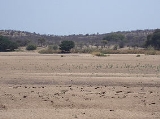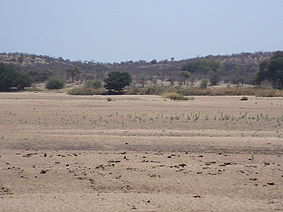
Tuli
Encyclopedia

Matabeleland South
Matabeleland South is a province of Zimbabwe. It has an area of 54,172 km² and a population of approximately 650,000 . Gwanda is the capital of the province.-Geography:...
, Zimbabwe
Zimbabwe
Zimbabwe is a landlocked country located in the southern part of the African continent, between the Zambezi and Limpopo rivers. It is bordered by South Africa to the south, Botswana to the southwest, Zambia and a tip of Namibia to the northwest and Mozambique to the east. Zimbabwe has three...
. It is located about 90 km west of Beitbridge
Beitbridge
Beitbridge or Mzingwane is a border town in the province of Matabeleland South, Zimbabwe. The name also refers to the border post and bridge spanning the Limpopo River, which forms the political border between South Africa and Zimbabwe.-Background:...
on the eastern bank of the Shashe River
Shashe River
The Shashe River is a major left-bank tributary of the Limpopo River in Zimbabwe.It rises northwest of Francistown, Botswana and flows into the Limpopo River where Botswana, Zimbabwe and South Africa meet, site of the Shalimpo Transfrontier Conservation Area.- Hydrology :The Shashe River is a...
. The village grew around Fort Tuli which was the first settlement built by the Pioneer Column
Pioneer Column
The Pioneer Column was a force raised by Cecil Rhodes and his British South Africa Company in 1890 and used in his efforts to annex the territory of Mashonaland, later part of Southern Rhodesia ....
in July 1890
1890s in Zimbabwe
See also:1880s in Zimbabwe,other events of 1890s,1900 in Zimbabwe and theTimeline of Zimbabwe history.-----1890:* 6 May - The Pioneer Column left Cecil Rhodes' farm at Kenilworth, a suburb of Kimberley, for Macloutsie under Col...
at the place known as Selous Camp and used by Frederick Selous
Frederick Selous
Frederick Courteney Selous DSO was a British explorer, officer, hunter, and conservationist, famous for his exploits in south and east of Africa. His real-life adventures inspired Sir H. Rider Haggard to create the fictional Allan Quatermain character. Selous was also a good friend of Theodore...
as a base for his hunting expeditions. The village is mainly a police post and associated housing.
The village can be accessed from Gwanda
Gwanda
Gwanda is the capital of the province of Matabeleland South in Zimbabwe. It is located on the Bulawayo-Beitbridge road and railway. Gwanda was founded in 1900. According to the 1982 Population Census, the town had a population of 4,874...
town via Guyu
Guyu
The traditional East Asian calendars divide a year into 24 solar terms . Gǔyù or more commonly pronounced as Gǔyǔ, or Kokuu is the 6th solar term. It begins when the Sun reaches the celestial longitude of 30° and ends when it reaches the longitude of 45°...
and Hwali
Hwali
Hwali is a ward in Gwanda District of Matabeleland South province in southern Zimbabwe....
, or from Beitbridge
Beitbridge
Beitbridge or Mzingwane is a border town in the province of Matabeleland South, Zimbabwe. The name also refers to the border post and bridge spanning the Limpopo River, which forms the political border between South Africa and Zimbabwe.-Background:...
via Nottingham and Shashi Irrigation Scheme, although the latter road is in very poor condition
History
Tuli was the first point at which the pioneer column, and many subsequent expeditions entered into MatabelelandMatabeleland
Modern day Matabeleland is a region in Zimbabwe divided into three provinces: Matabeleland North, Bulawayo and Matabeleland South. These provinces are in the west and south-west of Zimbabwe, between the Limpopo and Zambezi rivers. The region is named after its inhabitants, the Ndebele people...
and onward north to Salisbury
Harare
Harare before 1982 known as Salisbury) is the largest city and capital of Zimbabwe. It has an estimated population of 1,600,000, with 2,800,000 in its metropolitan area . Administratively, Harare is an independent city equivalent to a province. It is Zimbabwe's largest city and its...
(now Harare), the capital of Rhodesia
Rhodesia
Rhodesia , officially the Republic of Rhodesia from 1970, was an unrecognised state located in southern Africa that existed between 1965 and 1979 following its Unilateral Declaration of Independence from the United Kingdom on 11 November 1965...
as the country was then known. Tuli was the first location north of the Limpopo
Limpopo River
The Limpopo River rises in central southern Africa, and flows generally eastwards to the Indian Ocean. It is around long, with a drainage basin in size. Its mean annual discharge is 170 m³/s at its mouth...
/Shashe rivers where a 'European' style building was erected - the BSA Police Station was a wooden modular style Victorian building
Victorian architecture
The term Victorian architecture refers collectively to several architectural styles employed predominantly during the middle and late 19th century. The period that it indicates may slightly overlap the actual reign, 20 June 1837 – 22 January 1901, of Queen Victoria. This represents the British and...
, brought from the UK
United Kingdom
The United Kingdom of Great Britain and Northern IrelandIn the United Kingdom and Dependencies, other languages have been officially recognised as legitimate autochthonous languages under the European Charter for Regional or Minority Languages...
and erected to house members of the BSA Police who monitored the river crossing
Ford (crossing)
A ford is a shallow place with good footing where a river or stream may be crossed by wading or in a vehicle. A ford is mostly a natural phenomenon, in contrast to a low water crossing, which is an artificial bridge that allows crossing a river or stream when water is low.The names of many towns...
just south of the building's location. Until this time a large Fort (Fort Tuli) had existed on the southern bank of the Shashe where ox
Ox
An ox , also known as a bullock in Australia, New Zealand and India, is a bovine trained as a draft animal. Oxen are commonly castrated adult male cattle; castration makes the animals more tractable...
en and horse
Horse
The horse is one of two extant subspecies of Equus ferus, or the wild horse. It is a single-hooved mammal belonging to the taxonomic family Equidae. The horse has evolved over the past 45 to 55 million years from a small multi-toed creature into the large, single-toed animal of today...
s were rested prior to undertaking the river crossing. In the 1970s this building was re-located from its original site and erected at the site of the old, and now obliterated, Fort Tuli. It was used to house artifacts and items if historic interest which were found by persons in the area of the old Fort.
Fort Tuli was also the launching point of the Jameson Raid
Jameson Raid
The Jameson Raid was a botched raid on Paul Kruger's Transvaal Republic carried out by a British colonial statesman Leander Starr Jameson and his Rhodesian and Bechuanaland policemen over the New Year weekend of 1895–96...
into the South African Republic
South African Republic
The South African Republic , often informally known as the Transvaal Republic, was an independent Boer-ruled country in Southern Africa during the second half of the 19th century. Not to be confused with the present-day Republic of South Africa, it occupied the area later known as the South African...
which contributed significantly to the start of the Second Boer War
Second Boer War
The Second Boer War was fought from 11 October 1899 until 31 May 1902 between the British Empire and the Afrikaans-speaking Dutch settlers of two independent Boer republics, the South African Republic and the Orange Free State...
in the late 19th century.
Tuli Circle
Tuli also forms the centre of a 10 mile 'circle', the southern half of which stretches south of the Shashe River. This circle was established by the early pioneerSettler
A settler is a person who has migrated to an area and established permanent residence there, often to colonize the area. Settlers are generally people who take up residence on land and cultivate it, as opposed to nomads...
s with the agreement of local tribesmen as a no-go area
No-go area
A no-go area or no-go zone is a region where the ruling authorities have lost control and are unable to enforce the rule of law.-Rhodesia:The term 'no-go area' has a military origin and was first used in the context of the Bush War in Rhodesia...
for the grazing
Grazing
Grazing generally describes a type of feeding, in which a herbivore feeds on plants , and also on other multicellular autotrophs...
of local cattle
Cattle
Cattle are the most common type of large domesticated ungulates. They are a prominent modern member of the subfamily Bovinae, are the most widespread species of the genus Bos, and are most commonly classified collectively as Bos primigenius...
. This preserved the grazing and helped to prevent the spread of rinderpest
Rinderpest
Rinderpest was an infectious viral disease of cattle, domestic buffalo, and some other species of even-toed ungulates, including buffaloes, large antelopes and deer, giraffes, wildebeests and warthogs. After a global eradication campaign, the last confirmed case of rinderpest was diagnosed in 2001...
from the local cattle to the all important oxen needed for the trek north. The historic legacy of this, being that the international boundary
Border
Borders define geographic boundaries of political entities or legal jurisdictions, such as governments, sovereign states, federated states and other subnational entities. Some borders—such as a state's internal administrative borders, or inter-state borders within the Schengen Area—are open and...
separating Zimbabwe
Zimbabwe
Zimbabwe is a landlocked country located in the southern part of the African continent, between the Zambezi and Limpopo rivers. It is bordered by South Africa to the south, Botswana to the southwest, Zambia and a tip of Namibia to the northwest and Mozambique to the east. Zimbabwe has three...
from Botswana
Botswana
Botswana, officially the Republic of Botswana , is a landlocked country located in Southern Africa. The citizens are referred to as "Batswana" . Formerly the British protectorate of Bechuanaland, Botswana adopted its new name after becoming independent within the Commonwealth on 30 September 1966...
ceases to be the Shashe River for the section where it flows through the 'circle' and the "Tuli Circle" as it became known, was formed. This is a protected area, now the Thuli Parks and Wildlife Land
Thuli Parks and Wildlife Land
Thuli Parks and Wildlife Land is a protected area in south-western Zimbabwe. It comprises four areas within the Zimbabwe Parks and Wildlife Estate and covers the entire west bank of the Shashe River within the Thuli Circle....
.

